A collection of short films for primary schools, exploring the experiences and contributions of people from communities across the UK, and celebrating the rich contribution of the black community to the culture, society and economy of the UK.
In each film, pupils are introduced to different role models, focusing in particular on the experiences and contributors of black British people in post-war Britain. Each of these central characters is interviewed by a child of a similar age to your pupils.
These short films are suitable for teaching history at KS2 in England, Wales and Northern Ireland and at 2nd Level in Scotland. In the Key Stage 2 primary national curriculum in England, this series of history films fits neatly into a study of an aspect or theme in British history that extends pupils' chronological knowledge beyond 1066. Each film comes with teacher notes that detail some other areas of the curriculum beyond history that can link with the topics covered. These notes link to Scottish, English, Welsh and Northern Irish curriculums. All films also have a strong link to the PSHE curriculum, whether it is looking at identity and culture, community and responsibilities, diversity and challenging prejudice or career and aspirations. More information for teachers can be found on each page below.
We recommend starting by watching the film for teachers with Kara Joseph, who offers advice on how these short films might be used in the classroom.
We have also made available these teaching guidelines. Although this document accompanies another BBC Teach series, which is for secondary schools, some of the advice may help you to ensure a safe and inclusive environment for all pupils.
Primary teacher and deputy head Kara Joseph gives advice and guidance on how these short films might be used the classroom.
KARA:I'm Kara Joseph and I have been a primary teacher for over 13 years. I'm currently a deputy head teacher in London. In our school I'm responsible for curriculum design and I'm also the Black Caribbean Boys Champion. I'm excited to present to you a new series of films from BBC Teach for use in primary studies of black British history.
TINA:When I went to school, I was only one of two black children. I was very noticeable.
VERNON:My dad became the very first black bus driver in Bristol.
KARA:It's important to teach black history for many reasons. Britain is a diverse society and the history we teach needs to reflect the peoplewho are currently living here. All people should be represented across our whole curriculum. Children should be given the opportunity to connect with positive black role models from the past and be inspired. This new series of films celebrate the incredible contribution of the black community in the UK. In the films, pupils are introduced to different positive role models. Each central character is interviewed by a child of a similar age to the audience. At the end of the film, the child reflects on what they have learnt.
DANTE:I find Alison's story so inspiring because she helped so many people through her life. If it weren't for people like Alison, the NHS might not be able to look after us all.
HARLOW:It feels so good to know that the lives of people from long ago can live on forever in the stories that we write. And no matter where Iam in the world, Bermuda or the United Kingdom, I'm still connected to my community through a rich heritage of travel and storytelling.
KARA:Through these intergenerational conversations, pupils will learn how and why Britain has become so diverse, especially over the lastcentury. And they will also face wider questions to consider, such as how to make their own positive contribution to society.
NAOMI:Dennis's story is important because it teaches us that sometimes you have to stand up for yourself, and even if others won't believe in you, it's enough to believe in yourself.
ABD-RAHAMAN:Magid's story is important because it teaches us that history is alive and everything that we do can add to it. He makes me proud of my Somali heritage, and the thing that will stay with me the most is that no matter where we come from, we can find community and home wherever we end up.
KARA:There is also the recurring theme of artifacts. Artifacts are used to investigate story and memory. For example, Eunice uses fashion magazines, Yesha uses poetry, Elsie uses architecture and Dennis uses photography.
DENNIS:There's a very famous picture which I took where Bob looked back at me and said, "you ready Dennis?" and I went "click, click, yes", and the adventure began.
KARA:More traditional research objects are also used, such as maps, certificates and newspaper clippings. Every artifact tells a differentstory, and pupils will be inspired to investigate the objects that surround them and in turn uncover their own personal history.
A sense of landscape is also important in the films. The contributors walk around local streets, look at buildings and imagine the world as it once was. They visit libraries, farms, museums and town centres. The films feature communities from across the UK and can be used as examples for classes to follow as they explore their own local history. Mixing storytelling, artifacts, investigation, landscape and intergenerational conversation is a clever way to challenge pupil's concept of history. They will realise that history is happening all the time, and that is not just about things that have happened hundreds of years ago. It is also about things that have affected the people around them. It is something they can easily learn about and learn from, if only they ask the right questions.
Many primary and secondary schools are moving away from teaching black history in just one month of the year. Teaching black history all year round promotes a sense of identity and belonging in young people living in the UK. In the Key Stage 2 primary national curriculum, this series of history films fits neatly into a study of an aspect or theme in British history that extends pupils' chronological knowledge beyond 1066. Each film comes with teacher notes that detail some other areas of the curriculum beyond history that can link with the topics covered. These notes link to Scottish, English, Welsh and Northern Irish curriculums. All films have a strong link to the PSHE curriculum, whether it is looking at identity and culture, community and responsibilities, diversity and challenging prejudice or career and aspirations.
EUNICE:I was scouted by a model agent. I was coming from a background where I had had really bad experiences because of the color of my skin. Actually, people thought that I looked great, where I looked amazing, which to me was so unusual and so strange and it built my confidence so much.
KARA:Each set of teacher notes ends with a number of different activities or lesson extensions that can be used with your class. These may link to English, where pupils will be asked to write non-chronological reports, diaries or poetry. They may link to a particular subject like history, geography or music, with a lesson idea to match. They may also involve a more practical challenge linked to perseverance or aspiration. Importantly, there is also a key vocabulary list to help direct some of the discussion in class.
These films offer a basic understanding of how diverse Britain has become over the past century. Community and culture are recurring themes that allow important questions to be raised, prompting children to explore where they fit in their own community and think about their aspirations for the future. The films also challenge discrimination and prejudice. Pupils will be taught not to stereotype and instead to celebrate similarities and differences and so learn from a variety of role models. Pupils will be challenged to reflect on their own thoughts and feelings about each issue that is explored and in turn gain a greater understanding of the world they live in.
Mac Williams - Working in the coal mining industry. video
In this short film Abiodun MacDonald Williams, known to his close friends as Mac, talks to his neighbour, 11-year-old Iris, about what it was like working as a ventilation officer in County Durham in the 1960s.
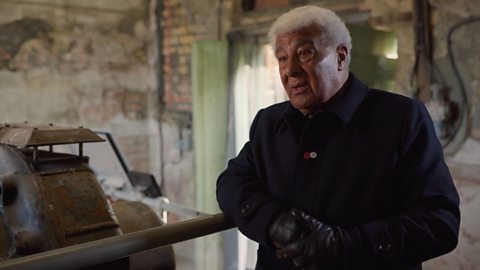
Alison Bennison - Working as a NHS nurse. video
This short film for primary schools follows Alison Bennison's journey to Britain from Barbados in 1960, to train as a nurse and work for the National Health Service. The story is told by Alison's granddaughter, Lindsey, and nine-year-old Dontay.
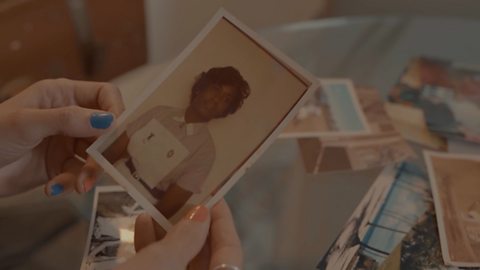
Christina Shingler - Becoming an author of children's literature. video
In this short film Felix, aged 10, talks to his grandmother Christina (Tina) Shingler, a writer who decided to do something about the lack of black characters in British literature.
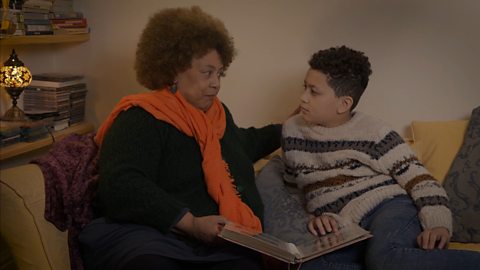
David Mwanaka - Becoming a farmer in Britain. video
In this short film 11-year-old Anashe meets David Mwanaka, and finds out about his journey from Zimbabwe to becoming a farmer in Britain.
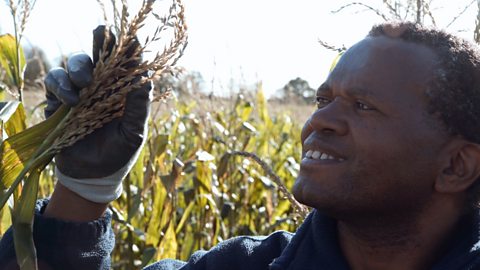
Dennis Morris - Becoming a photographer. video
This short film tells the story of Dennis Morris, a well-known photographer from London, originally from Jamaica, who photographed famous musicians including Bob Marley.
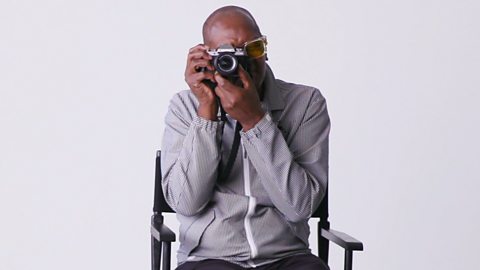
Elsie Owusu - Becoming an architect in Britain. video
In this short film 11-year-old Kendra meets Elsie Owusu, who moved from Ghana to the UK as a child and became an architect, and dealt with the challenges of working in a white, male-dominated profession.
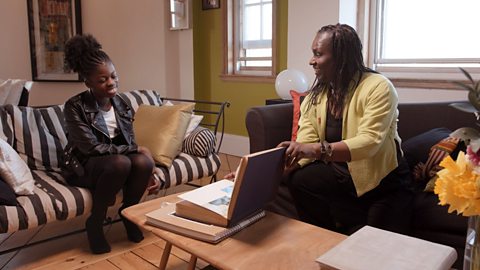
Eunice Olumide - Breaking into the fashion business. video
In this short film 12-year-old Lore meets Eunice Olumide, a second generation Nigerian who was born and grew up in Scotland and become a professional model.

Magid Magid - Becoming the youngest ever Lord Mayor of Sheffield. video
In this short film 14-year-old Abdirahman meets Magid Magid, a Somali-British activist and politician who served as the youngest ever Lord Mayor of Sheffield from May 2018 - May 2019.
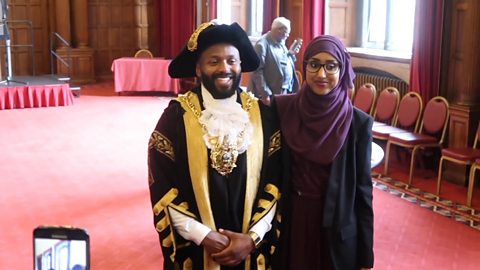
Vernon Samuels - The Bristol Bus Boycott of 1963. video
In this short film 13-year-old Amelia and Vernon Samuels, who represented Great Britain in the 1988 Olympics, tell the story of the Bristol Bus Boycott and Vernon's father, who was the first black bus driver in Bristol.
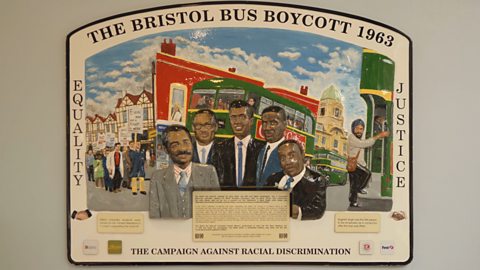
Yesha Townsend - A Bermudian poet in London. video
This short film tells the story of Yesha Townsend, a Bermudian poet who currently lives and works in London, and how she has been influenced by Mary Prince, a black woman who escaped from slavery.
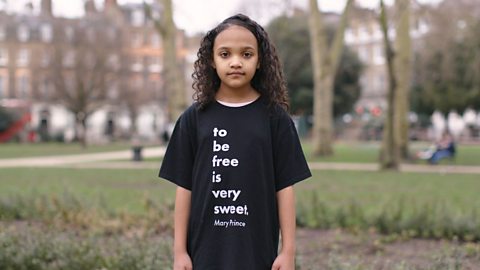
External learning-related websites:
- Salford City Council - A selection of lesson plans for teaching KS2 pupils about the Empire Windrush and Caribbean migration.
Where next?
Black British Stories. collection
A collection of short films for primary schools, exploring the experiences and contributions of people from communities across the UK, and celebrating the rich contribution of the black community to the culture, society and economy of the UK.
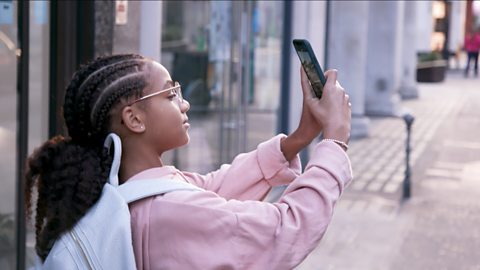
Bitesize
Use these Bitesize resources to set homework, independent study tasks or to consolidate learning for your pupils.

Newsround
The latest news stories from Newsround to share in the classroom.
